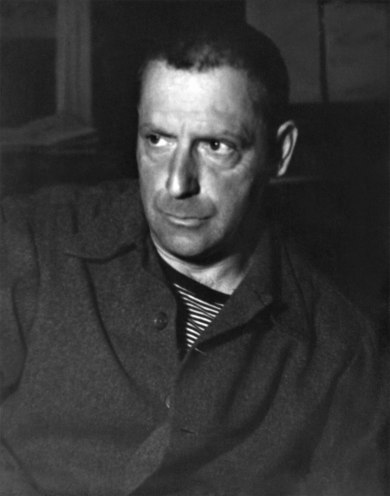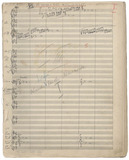Paul Dessau
In Berlin war die ganze Atmosphäre schon vergiftet, die Nazis waren bereits da. Auf den Straßen erklang „Wenn das Judenblut vom Messer spritzt ...“ – dazu gehöre ich ja auch. Für uns war das Leben unerträglich geworden. Es war alarmierend!
[In Berlin the whole atmosphere was poisonous, the Nazis were already there. On the streets you heard “When the Jewish blood squirts from the knife...” – that includes me. Life had become unbearable. It was alarming! (ed. trans.)]
Paul Dessau, Aus Gesprächen, 1974
| Born | on 19 December 1894 in Hamburg, Germany |
|---|---|
| Died | on 28 June 1979 in Königs Wusterhausen, Germany |
| Exile | France, United States of America |
| Remigration | German Democratic Republic |
| Profession | Composer, Conductor |
Paul Dessau had lived in Berlin since the end of the 1920s. Initially he worked as a conductor at the Städtische Oper Berlin under the direction of general musical director Bruno Walter. But Dessau was no friend of the opera business; rather, he was drawn to composing his own works, and he was able to use his gift in film. Berlin was the capital of German film and offered attractive projects for composers: Dessau worked on 17 sound films as a composer and conductor between 1929 and 1933. Later, in exile in France and the US, film again became an important source of income for him.
Dessau's first station in exile was France for six years, first in Paris and then various suburbs of Paris. In 1939, the composer emigrated to the US with the help of a cousin who was also in exile. He settled in New York, where he taught music at a New York children's home and for a short time worked on a chicken farm.
In 1943, Dessau moved to Los Angeles, not least in the hope that being near Hollywood would bring him more film music jobs. In subsequent years he wrote the music for a large number of Hollywood films and was often in charge of the musical direction for recordings. He was thus able to build on the experience and successes of his Berlin years.
In 1948, Dessau returned to Germany. He opted for the Soviet-occupied zone, the later GDR, and settled in East Berlin. Here he continued his collaboration with Bertolt Brecht and was instrumental in building up the GDR's cultural scene
Selected works:
Erstes Streichquartett (1932)
Haggada (oratorio, 1936)
Awodah (film music, director: Helmar Lerski, 1935)
Adamah (film music, director: Helmar Lerski, 1947)
The Paradin Case (film music, director: Alfred Hitchcock, 1947)
Deutsches Miserere (in collaboration with Bertolt Brecht, 1943-1944)
Einstein (opera, 1969-1972)
Mutter Courage und ihre Kinder (stage music, in collaboration with Bertolt Brecht, 1946-1949)
Der gute Mensch von Sezuan (stage music, in collaboration with Bertolt Brecht, 1947-1948)
Der kaukasische Kreidekreis (stage music, in collaboration with Bertolt Brecht, 1953-1954)
Further reading:
Dessau, Paul: Aus Gesprächen. Erschienen anlässlich des 80. Geburtstags von Paul Dessau. Leipzig: Deutscher Verlag für Musik, VEB 1974
Dessau, Paul: Dokumente zu Leben und Werk. Zusammengestellt von kommentiert von Daniela Reinhold. Stiftung Archiv der Akademie der Künste. Berlin: Henschel Verlag 1995
Reinhold, Daniela: Paul Dessau. In: Lexikon verfolgter Musikerinnen und Musiker der NS-Zeit, hg. von Maurer Zenck, Claudia / Petersen, Peter, unter Mitarbeit von Fetthauer, Sophie. Universität Hamburg, seit 2005 http://www.lexm.uni-hamburg.de/object/lexm_lexmperson_00001411


